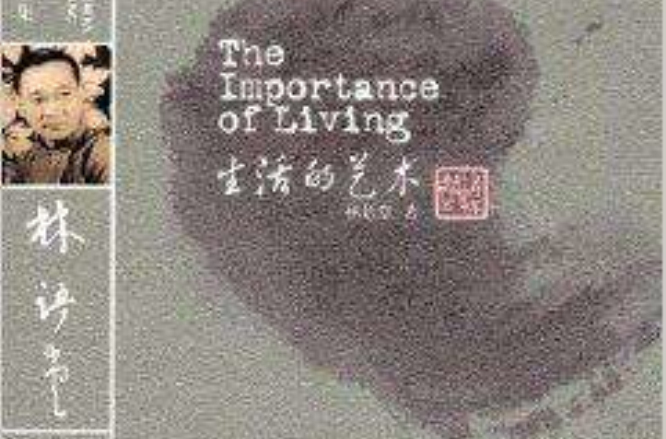《林語堂英文作品集:生活的藝術》一書中,作者林語堂談了莊子的淡泊,贊了陶淵明的閒適,誦了《歸去來兮辭》,講了《聖經》的故事,以及中國人如何品茗,如何行酒令,如何觀山,如何玩水,如何看雲,如何鑒石,如何養花、蓄鳥、賞雪、聽雨、吟風、弄月……林語堂將中國人曠懷達觀,陶情遣興的生活方式,和浪漫高雅的東方情調皆訴諸筆下,向西方人娓娓道出了一個可供仿效的“完美生活的範本,快意人生的典型”,展現出詩樣人生、才情人生、幽默人生、智慧人生的別樣風情。從詩到詩——中國古詩詞英譯從詩到詩(中國古詩詞英譯)古文觀止古文觀止精選(漢英對照)人文勝跡--國中以上英文水平讀者莎翁故居國王谷:人文勝跡雅典衛城:人文勝跡龐貝城與赫庫蘭尼姆城:人文勝跡哈德良長城林語堂英文作品集印度的智慧(林語堂英文作品集)(月亮石)武則天傳京華煙雲(英文版)京華煙雲吾國與吾民吾國與吾民(英文版)老子的智慧生活的藝術生活的藝術(林語堂英文作品集)(月亮石)風聲鶴唳(林語堂英文作品集)(月亮石)京華煙雲吾國與吾民生活的藝術
基本介紹
- 書名:林語堂英文作品集:生活的藝術
- 類型:英語與其他外語
- 出版日期:2009年3月1日
- 語種:英語
- ISBN:7560081398, 9787560081397
- 作者:林語堂
- 出版社:外語教學與研究出版社
- 頁數:477頁
- 開本:32
- 品牌:外語教學與研究出版社
內容簡介
《林語堂英文作品集》是林語堂用英文創作的一系列作品,曾經轟動歐美文壇,影響深遠,一直被視為闡述東方文化的權威著作。此外。本套圖書獨家原版引進,眾多著作以英文原貌首次登入國內;數十幅珍貴老照片真實回味過去的時光。重磅上市,值得珍藏!
作者簡介
精彩點評
媒體推薦
——《紐約時報》星期日書評
名人推薦
——美國總統布希
書籍目錄
PREFACE
Chapter One THE AWAKENING
Ⅰ.APPROACH TO LIFE
Ⅱ.A PSEUDO-SCIENTIFIC FORMULA
Ⅲ.THE SCAMP AS IDEAL
Chapter Two VIEWS OF MANKIND
Ⅰ.CHRISTIAN, GREEK AND CHINESE
Ⅱ.EARTH-BOUND
Ⅲ.A BIOLOGICAL VIEW
Ⅳ.HUMAN LIFE A POEM
Chapter Three OUR ANIMAL HERITAGE
Ⅰ.THE MONKEY EPIC
Ⅱ.IN THE IMAGE OF THE MONKEY
Ⅲ.ON BEING MORTAL
Ⅳ.ON HAVING A STOMACH
Ⅴ.ON HAVING STRONG MUSCLES
Ⅵ.ON HAVING A MIND
Chapter Four ON BEING HUMAN
Ⅰ.ON HUMAN DIGNITY
Ⅱ.ON PLAYFUL CURIOSITY: THE RISE OF HUMAN CIVILIZATION
Ⅲ.ON DREAMS
Ⅳ.ON THE SENSE OF HUMOUR
Ⅴ.ON BEING WAYWARD AND INCALCULABLE
Ⅵ.THE DOCTRINE OF THE INDIVIDUAL
Chapter Five WHO CAN BEST ENJOY LIFE?
Ⅰ.FIND THYSELF: CHUANGTSE
Ⅱ.PASSION, WISDOM AND COURAGE: MENCIUS
Ⅲ.CYNICISM, FOLLY AND CAMOUFLAGE: LAOTSE
Ⅳ."PHILOSOPHY OF HALF-AND-HALF": TSESSE
Ⅴ.A LOVER OF LIFE: T'AO YUANMING
Chapter Six THE FEAST OF LIFE
Ⅰ.THE PROBLEM OF HAPPINESS
Ⅱ.HUMAN HAPPINESS IS SENSUOUS
Ⅲ.CHIN'S THIRTY-THREE HAPPY MOMENTS
Ⅳ.MISUNDERSTANDINGS OF MATERIALISM
Ⅴ.HOW ABOUT MENTAL PLEASURES?
Chapter Seven THE IMPORTANCE OF LOAFING
Ⅰ.MAN THE ONLY WORKING ANIMAL
Ⅱ.THE CHINESE THEORY OF LEISURE
Ⅲ.THE CULT OF THE IDLE LIFE
Ⅳ.THIS EARTH THE ONLY HEAVEN
Ⅴ.WHAT IS LUCK?
Ⅵ.THREE AMERICAN VICES
Chapter Eight THE ENJOYMENT OF THE HOME
Ⅰ.ON GETTING BIOLOGICAL
Ⅱ.CELIBACY A FREAK OF CIVILIZATION
Ⅲ.ON SEX APPEAL
Ⅳ.THE CHINESE FAMILY IDEAL
Ⅴ.ON GROWING OLD GRACEFULLY
Chapter Nine THE ENJOYMENT OF LMNG
Ⅰ.ON LYING IN BED
Ⅱ.ON SITTING IN CHAIRS
Ⅲ.ON CONVERSATION o
Ⅳ.ON TEA AND FRIENDSHIP
Ⅴ.ON SMOKE AND INCENSE
Ⅵ.ON DRINK AND WINE GAMES
Ⅶ.ON FOOD AND MEDICINE
Ⅷ.SOME CURIOUS WESTERN CUSTOMS
Ⅸ.THE INHUMANITY OF WESTERN DRESS
Ⅹ.ON HOUSE AND iNTERIORS
Chapter Ten THE ENJOYMENT OF NATURE
Ⅰ.PARADISE LOST?
Ⅱ.ON BIGNESS
Ⅲ.TWO CHINESE LADIES
Ⅳ.ON ROCKS AND TREES
Ⅴ.ON FLOWERS AND FLOWER ARRANGEMENTS
Ⅵ.THE "VASE FLOWERS" OF YUAN CHUNGLANG
Ⅶ.THE EPIGRAMS OF CHANG CH'AO
Chapter Eleven THE ENJOYMENT OF TRAVEL
Ⅰ.ON GOING ABOUT AND SEEING THINGS
Ⅱ."THE TRAVELS OF MINGLIAOTSE"
Chapter Twelve THE ENJOYMENT OF CULTURE
Ⅰ.GOOD TASTE IN KNOWLEDGE
Ⅱ.ART AS PLAY AND PERSONALITY
Ⅲ.THE ART OF READING
Ⅳ.THE ART OF WRITING
Chapter Thirteen RELATIONSHIP TO GOD
Ⅰ.THE RESTORATION OF RELIGION
Ⅱ.WHY I AMA PAGAN
Chapter Fourteen THE ART OF THINKING
Ⅰ.TIlE NEED OF HUMANIZED THINKING
Ⅱ.THE RETURN TO COMMON SENSE
Ⅲ.BE REASONABLE
CERTAIN CHINESE NAMES
A CHINESE CRITICAL VOCABULARY
WADE-GILES TO PINY1N CONVERSION TABLE
WORKS IN ENGLISH BY LIN YUTANG
文摘
序言
The Pastor was not a follower of convention, so the boys did not wearqueues. Yutang was a little guy, deeply tanned, with a prominent forehead, apair of sparkling eyes, and a narrow chin. Six miles later, when the skiff cameto Xiaoxi, the boys changed to a five-sail junk, and sailed toward Zhangzhouon West River. There were paddy fields and farmhouses on either side ofthe river, and tall mountains stood behind them, clad in grey-purplishhues. Yutang thought it inexpressibly beautiful. After a day's journey, the junkwas tied up against the bank under some bamboo trees. Yutang was told to liedown, cover himself with a blanket and go to sleep.
But sleep was the last thing on the boy's mind. The boatman sitting at the junk's stern was sucking at his pipe, and between gulps of bitter tea, telling stories about the Empress Dowager Cixi, who ruled the court today, having put the Emperor Guangxu under house arrest for supporting the reformers at the palace. Another junk was tied up on the opposite bank, brightly lit by lanterns. A soft breeze wafted sounds of merrymaking and music from a lute across the water. Oh, what a beautiful scene!

